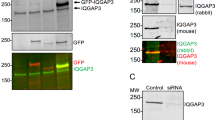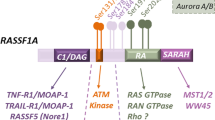Abstract
The Rho family of small GTPases has attracted considerable research interest over the past 5 years. During this time, we have witnessed a remarkable increase in our knowledge of the biochemistry and biology of these Ras-related proteins. Thus, Rho family proteins have begun to rival, if not overshadow, interest in their more celebrated cousins, the Ras oncogene proteins. The fascination in Rho family proteins is fueled primarily by two major observations. First, like Ras, Rho family proteins serve as guanine nucleotide-regulated binary switches that control signaling pathways that in turn regulate diverse cellular processes. Rho family proteins are key components in cellular processes that control the organization of the actin cytoskeleton, activate kinase cascades, regulate gene expression, regulate membrane trafficking, promote growth transformation and induce apoptosis. Second, at least five Rho family proteins have been implicated as critical regulators of oncogenic Ras transformation. Thus, it is suspected that Rho family proteins contribute significantly to the aberrant growth properties of Ras-transformed cells. Rho family proteins are also critical mediators of the transforming actions of other transforming proteins and include Dbl family oncogene proteins, G protein-coupled receptors and G protein α subunits. Thus, Rho family proteins may be key components for the transforming actions of diverse oncogene proteins. Major aims of Rho family protein studies are to define the molecular mechanism by which Rho family proteins regulate such a diverse spectrum of cellular behavior. These efforts may reveal novel targets for the development of anti-Ras and anti-cancer drugs.
This is a preview of subscription content, access via your institution
Access options
Subscribe to this journal
Receive 50 print issues and online access
$259.00 per year
only $5.18 per issue
Buy this article
- Purchase on Springer Link
- Instant access to full article PDF
Prices may be subject to local taxes which are calculated during checkout
Similar content being viewed by others
Author information
Authors and Affiliations
Rights and permissions
About this article
Cite this article
Zohn, I., Campbell, S., Khosravi-Far, R. et al. Rho family proteins and Ras transformation: the RHOad less traveled gets congested. Oncogene 17, 1415–1438 (1998). https://doi.org/10.1038/sj.onc.1202181
Published:
Issue Date:
DOI: https://doi.org/10.1038/sj.onc.1202181
Keywords
This article is cited by
-
Identification of excretory and secretory proteins from Haemonchus contortus inducing a Th9 immune response in goats
Veterinary Research (2022)
-
Naegleria fowleri: differential genetic expression following treatment with Hesperidin conjugated with silver nanoparticles using RNA-Seq
Parasitology Research (2020)
-
A Cdc42 homolog in Colletotrichum gloeosporioides regulates morphological development and is required for ROS-mediated plant infection
Current Genetics (2018)
-
Methylation of DIRAS1 promotes colorectal cancer progression and may serve as a marker for poor prognosis
Clinical Epigenetics (2017)
-
The Nogo-B receptor promotes Ras plasma membrane localization and activation
Oncogene (2017)



